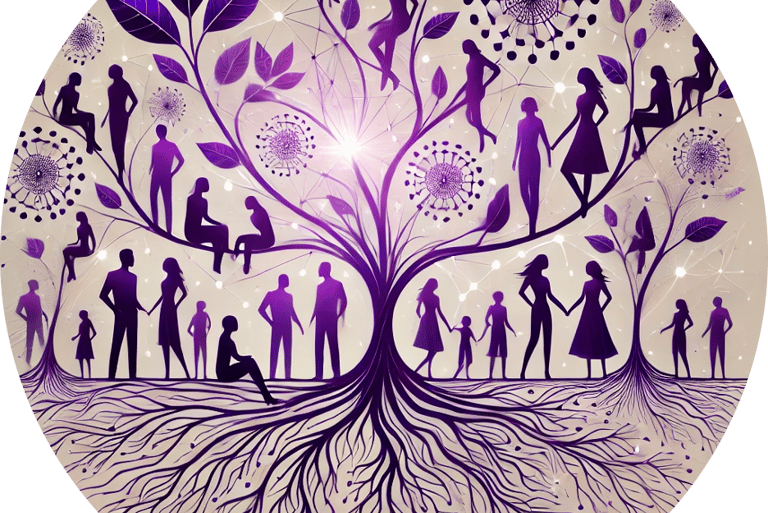Connecting the Dots: Oppressive Systems Create Traumatized People
Rooted in Healing: From Survival to Liberation- Blog Post 2
PERSONAL WORKTRANSFORMATIVE CONFLICT
With Love, Mariah Laird
1/6/20253 min read
As I progressed in my healing journey, I began to see how deeply my behaviors and actions were affected by my life experiences and the social norms that influenced me. (1) An epiphany emerged: the people in my life, even those who caused me pain, might not be entirely to blame for the hurt they caused. Just as external forces had influenced my choices, they too were shaped by circumstances beyond their control. This revelation was both liberating and unsettling. I found myself grappling with the idea of forgiveness—not as a way to excuse their harmful actions, but as a compassionate acknowledgment of how their struggles had shaped the way they showed up in the world.
The arguments I encountered over spending money, struggles with expressing emotions, uncertainty about life’s direction, and the weight of scarcity mindsets and relentless stress reflect a deeper reality: the Black American experience. Since 1619, Black people have faced limited or no access to time, money, power, resources, and growth opportunities. We have fought tirelessly to move from survival to contentment, but for many of us, true thriving remains out of reach. According to 2023 Census data, 17.9% of Black people lived in poverty compared to 9.9% of white people, with Indigenous people experiencing an even higher poverty rate of 21.2%. (2) These disparities underscore the entrenched oppressive nature of the American experience. Learning to survive racist and oppressive systems has left little space to learn and practice healthy emotional expression or constructive approaches to resolving intra- and interpersonal conflict. (3)
While some Black families have transcended these struggles, centuries of systemic oppression have made it difficult for most of us to truly flourish, both individually and collectively. A 2024 Urban Institute report revealed that Black homeownership rates stood at 44.3%, lower than in 2000 (45.7%). Alarmingly, the report stated that “the Black-white homeownership gap is wider than it was when segregation was legal.” (4) This inequity is significant because access to housing is a key measure of quality of life. Concepts like “Social Determinants of Health” and systemic inequities, which I had learned about through college and my work experiences and once found relatable, suddenly reverberated on a deeply personal level.
This inequity is significant because access to housing is a key measure of quality of life. Concepts like “Social Determinants of Health” and systemic inequities, which I had learned about through college and my work experiences and once found relatable, suddenly reverberated on a deeply personal level.
The convergence of my healing journey, lived experiences, and academic knowledge made the realities of how systemic racism afflicted the lives of my family, community, and me inescapable. It shapes not only our daily experiences but also the sharpness of our minds, the health of our bodies, and the joy that offers us moments of reprieve. (5)
This newfound awareness allowed me to see people as whole, complex beings—shaped by both the choices they’ve made and the ones denied to them—deserving of grace and empathy as they carry the weight of systemic racism. I found myself seeking out more knowledge to explain this phenomenon I was living. I turned to literature that centered the Black experience and consumed the words of Black advocates, researchers, and leaders. I immersed myself in understanding how my Black ancestors remained resilient in the face of oppression.
This knowledge unlocked a passion and purpose in me that I never thought I would find: cultivating safety, care, and love for my people. I felt compelled to shout to the world, It doesn’t have to be this way. It is possible to reclaim the joy and peace stolen from our ancestors, which the system continues to try to take from us. The answers lie in the history of pain and resilience of our Black ancestors and their relentless fight to hold onto their power. (6)
Transforming my trauma to reclaim my voice, power, and self-worth opened my eyes to how systemic racism deliberately seeks to undermine my people’s collective voice and power, keeping our liberation an abstract concept.


References:
1-Calderon De La Barca, L., Milligan, K., & Kania, J. (2024, February 12). Healing Systems. Standford Social Innovation Review. https://ssir.org/articles/entry/healing-trauma-systems#
2- US Census Bureau. (2024, September 3). Poverty in the United States: 2023. Census.gov. https://www.census.gov/library/publications/2024/demo/p60-283.html
3- Evans, S. (2019, June). Systemic Oppression and Trauma: Why Healing-centered, Two-generation Approaches are Crucial to Poverty Alleviation - Center for Hunger Free Communities. Center for Hunger Free Communities. https://drexel.edu/hunger-free-center/research/briefs-and-reports/systemic-oppression-and-trauma/
4- Choi, J. H., Zinn, A., & Mehrotra, A. (2024, February 21). Black Homeownership Increased Slightly during the Pandemic, but High Interest Rates Threaten to Further Widen Racial Homeownership Gaps. Urban Institute. https://www.urban.org/urban-wire/black-homeownership-increased-slightly-during-pandemic-high-interest-rates-threaten
5- Winters, M. (2020). Black Fatigue: How Racism Erodes the Mind, Body, and Spirit. Berrett-Koehler Publishers.
6- Page, C., & Woodland, E. (2023). Healing justice lineages: Dreaming at the Crossroads of Liberation, Collective Care, and Safety. North Atlantic Books.


